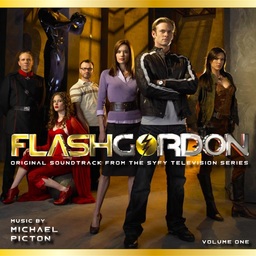
Unfortunately, Syfy's short-lived Flash Gordon reboot never escaped the shadow of that cult classic. To be sure, the show retained a few of the elements that made it successful, mainly the kitsch factor, but its story and execution varied greatly from the Flash that people knew. What's more, the show was noticeably under-budgeted, rendering its special effects laughable and every "alien" locale vaguely reminiscent of Canadian woodlands. All of this doomed Flash Gordon to feel more like a bad episode of Doctor Who than the revelation that was Battlestar Galactica, which the show undoubtedly aspired to rival.
In tandem with its two serviceably charismatic leads, Flash Gordon is carried by Michael Picton's score. A predominantly synthesized endeavor (given the budget, this is no surprise), the score is a melding of different styles, from traditional orchestral to campy rock to occasional "non-western" flares for the tribal Hawkmen (here they are referred to as "Dactyls"). Written by Picton as a sort of "audition" for the show, the main theme is heard in "Flash Gordon," and is a swift, sweeping, and decidedly retro adventure theme. A callback to 60's spy thrillers, there is a definite sense of campy fun here, though the theme itself isn't as much of an ear-worm as it could be. Oddly, enough, the strongest theme in Volume One is not the show's main titles, but a bold identity introduced in "Execution." After a handful of somewhat anonymous tracks, highlighted by the upbeat, rock-infused "Race" and the varied "Mings Fury/Dale's Theme/Dr. Gordon" (the middle section of which features a pleasant piano motif), Picton completely takes the listener by surprise with the thematic boldness of "Execution." It's the kind of thing that makes you immediately sit up and pay attention. Accompanying a scene in the show's third episode in which Ming sentences an ice smuggler to death, the track builds to a soulful, wordless lament performed by Kate St. Pierre (a frequent Two Steps from Hell collaborator) punctuated by powerful orchestral chords. It's clear that Picton recognizes the strength and malleability of this theme, as he allows it to pervade a handful of subsequent tracks. "Forest Battle" and "Rescue Attempt", the two strongest cues outside of "Execution," rely heavily on the theme, as does "Flash and Vultan" and "Old Joe." Outside of the handful of themes mentioned, Flash Gordon is largely an exploration of different colors and rhythms, sometimes effective (as in "Life Source", which melds major and minor keys quite nicely) and at other times anonymous (as in much of the percussive "tribal" music, which many listeners will either take or leave).
It's surprising that Flash Gordon marks Michael Picton's first foray into television scoring, as he tackles what could be a difficult show to score with care and, occasionally, flair. Though I think it was a good choice to incorporate the rock elements and kitschier flourishes (i.e. synthesized bird shrieks for the Dactyls, a catchy brass motif in "Dactyl Dance"), the score begins to loose me when it strays too far into the comedic. As the show seems to demand this, though, that's not too much of a knock on Picton's abilities. When he's attempting to lend a sense of maturity and gravitas to Flash Gordon, the composer's talents indeed shine through. What's more, it's admirable that Picton tries to escape the shadow of Queen's magnum opus, blazing his own trail as best he can with the tools afforded to him. Quite unexpectedly, I'm intrigued to check out Volume Two!
|
A Few Recommended Tracks: "Execution," "Forest Chase," "Rescue Attempt," "Dactyl Dance," "Life Source" Label: Perseverance Records Availability: 30-track edition |
|

 RSS Feed
RSS Feed
